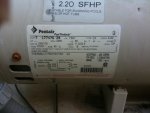So the pool pump on our new house is making this weird sound. I'm familiar with the bearing squeal, but this is more of a glug glug glug. Kinda like if my pump had a racing cam in it ;-). The previous owner said it was due to it being 2hp and having to pump to the roof for the solar heat. I didn't fully buy that, so I asked the pool company that installed it to come out. The pool company says it's a bad capacitor on the motor and want to replace the motor for $300. I thought I'd try and get my friends at TFP to lend me a hand in figuring out exactly what's wrong. I'm thinking a capacitor would be an easy fix and certainly less than $300. But don't want to go through the hassle if that's not a proper diagnosis. The pump works fine, but the constant noise is annoying. And once someone builds a house next door, they will have our heads if we leave it like this. I can hear it indoors on the 2nd floor with everything closed.
I put a video of it up at http://www.youtube.com/watch?v=E3oGv7Qk4cY.
Thanks in advance!
I put a video of it up at http://www.youtube.com/watch?v=E3oGv7Qk4cY.
Thanks in advance!


